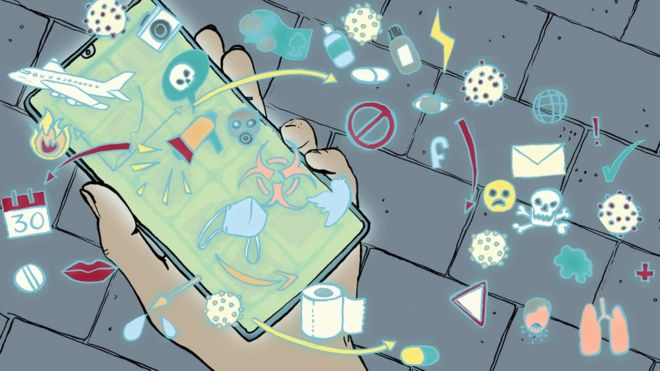 Image copyrightEMMA RUSSELL
Image copyrightEMMA RUSSELLCoronavirus has plunged the world into uncertainty and the constant news about the pandemic can feel relentless. All of this is taking its toll on people’s mental health, particularly those already living with conditions like anxiety and OCD. So how can we protect our mental health?
Being concerned about the news is understandable, but for many people it can make existing mental health problems worse.
When the World Health Organization released advice on protecting your mental health during the coronavirus outbreak, it was welcomed on social media.
As Anxiety UK’s Nicky Lidbetter explains, the fear of being out of control and unable to tolerate uncertainty are common characteristics of many anxiety disorders. So it’s understandable that many individuals with pre-existing anxiety are facing challenges at the moment.
“A lot of anxiety is rooted in worrying about the unknown and waiting for something to happen – coronavirus is that on a macro scale,” agrees Rosie Weatherley, spokesperson for mental health charity Mind.
So how can we protect our mental health?
Limit the news and be careful what you read
Reading lots of news about coronavirus has led to panic attacks for Nick, a father-of-two from Kent, who lives with anxiety.
“When I’m feeling anxious my thoughts can spiral out of control and I start thinking about catastrophic outcomes,” he says. Nick is worried about his parents and other older people he knows.
“Usually when I suffer I can walk away from a situation. This is out of my control,” he says.
Having long periods away from news websites and social media has helped him to manage his anxiety. He has also found support helplines, run by mental health charities such as AnxietyUK, useful.
- Limit the amount of time you spend reading or watching things which aren’t making you feel better. Perhaps decide on a specific time to check in with the news
- There is a lot of misinformation swirling around – stay informed by sticking to trusted sources of information such as government and NHS websites

Media captionTips on managing anxiety and OCD during the coronavirus pandemic
Have breaks from social media and mute things which are triggering
Alison, 24, from Manchester, has health anxiety and feels compelled to stay informed and research the subject. But at the same time she knows social media can be a trigger.
“A month ago I was clicking on hashtags and seeing all this unverified conspiracy rubbish and it would make me really anxious and I would feel really hopeless and cry,” she says.
Now she is careful about which accounts she tunes into and is avoiding clicking on coronavirus hashtags. She is also trying hard to have time away from social media, watching TV or reading books instead.
- Mute key words which might be triggering on Twitter and unfollow or mute accounts
- Mute WhatsApp groups and hide Facebook posts and feeds if you find them too overwhelming
bbc.com / balkntimes.press
Napomena o autorskim pravima: Dozvoljeno preuzimanje sadržaja isključivo uz navođenje linka prema stranici našeg portala sa koje je sadržaj preuzet. Stavovi izraženi u ovom tekstu autorovi su i ne odražavaju nužno uredničku politiku The Balkantimes Press.
Copyright Notice: It is allowed to download the content only by providing a link to the page of our portal from which the content was downloaded. The views expressed in this text are those of the authors and do not necessarily reflect the editorial policies of The Balkantimes Press.

